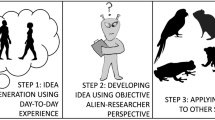Abstract
Our discussions of animal cognition were strongly influenced by the composition of our group, which ranged over a very broad spectrum from ethology to operant conditioning and cognitive psychology to social psychology. To find some common denominator in that diversity proved to be an interesting and stimulating task. What eventually emerged was a rephrasing of our initial discussion topic, and a concentration on the potential contributions that human cognitive psychology could make to the study of animal cognition.
Access this chapter
Tax calculation will be finalised at checkout
Purchases are for personal use only
Preview
Unable to display preview. Download preview PDF.
Similar content being viewed by others
References
Anderson, J.R. 1980. Cognitive Psychology and Its Applications. San Francisco: Freeman.
Borner, J. 1980. Animal Culture. Princeton: Princeton University Press.
Bower, G.H., and Hilgard, E.R. 1980. Theories of Learning. Englewood Cliffs, NJ: Prentice-Hall.
Herrnstein, R.J., and de Villiers, P.A. 1980. Fish as a natural category for people and pigeons. In The Psychology of Learning and Motivation, ed. G.H. Bower, vol. 14. New York: Academic Press.
Klix, F., and Hoffman, J. 1980. Cognition and Memory. Berlin: VEB Deutscher Verlag der Wissenschaften.
Kintsch, W. 1977. Memory and Cognition. New York: Wiley.
Navon, D., and Gopher, D. 1979. On the economy of the human processing system. Psychol. Rev. 86: 214–255.
Norman, D.A., and Bobrow, D.J. 1975. On data-limited and resource-limited processes. Cog. Psychol. 7: 44–64.
Piaget, J. 1937. La construction du réel chez l’enfant Neuchâtel: Delachaux et Niestlé.
Pryor, K.W.; Haag, R.; and O’Reilly, J. 1969. The creative porpoise. Training for novel behavior. J. Exp Anal. Behav. 12: 653–661.
Resnick, L.B. 1976. The Nature of Human Intelligence. Hillsdale, NJ: Erlbaum.
Rosch, E.; Mervis, C.B.; Gray, W.; Johnson, D.; and Boyes-Braem, P. 1976. Basic objects in natural categories. Cog. Psychol. 8: 382–439.
Shiffrin, R.M., and Schneider, W. 1977. Controlled and automatic human information processing II: Perceptual learning, automatic attending, and a general theory. Psychol. Rev. 84: 127–190.
Sutherland, N.S. 1959. Stimulus analyzing mechanisms. In Proceedings of a Symposium for the Mechanization of Thought Processes, vol. II. London: H.M. Stationary Office.
Editor information
Rights and permissions
Copyright information
© 1982 Dr. S. Bernhard, Dahlem Konferenzen, Berlin
About this paper
Cite this paper
Kintsch, W. et al. (1982). Comparative Approaches to Animal Cognition State of the Art Report. In: Griffin, D.R. (eds) Animal Mind — Human Mind. Life Sciences Research Reports, vol 21. Springer, Berlin, Heidelberg. https://doi.org/10.1007/978-3-642-68469-2_19
Download citation
DOI: https://doi.org/10.1007/978-3-642-68469-2_19
Publisher Name: Springer, Berlin, Heidelberg
Print ISBN: 978-3-642-68471-5
Online ISBN: 978-3-642-68469-2
eBook Packages: Springer Book Archive




